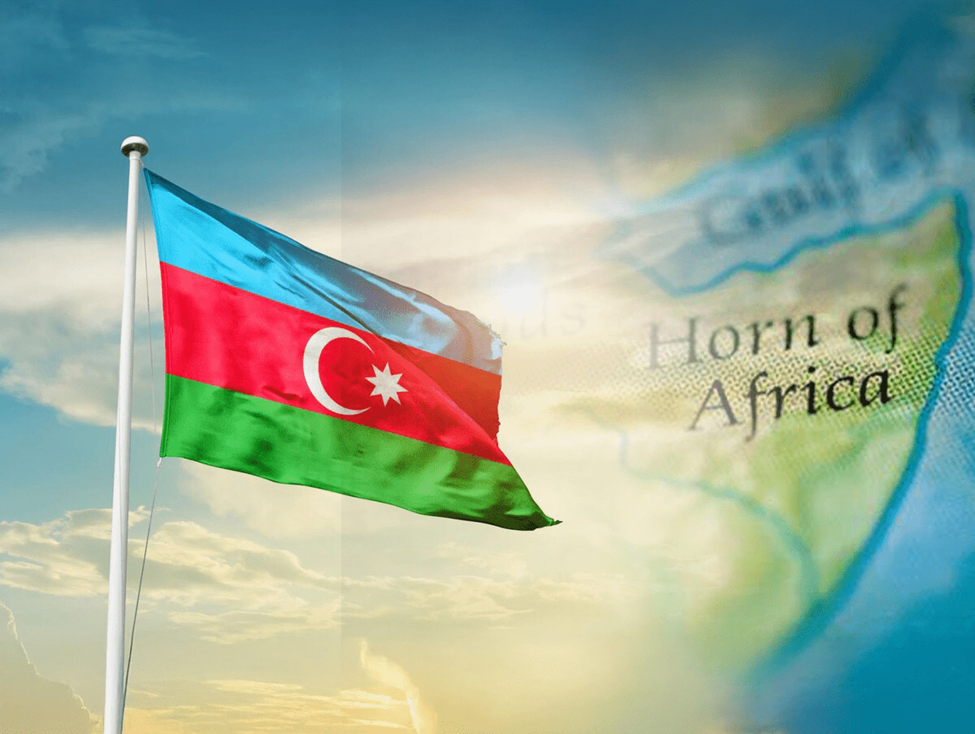The recapture of the Nagorno-Karabakh region by Azerbaijan in 2023 represented a critical juncture in its foreign policy, prompting Baku to redefine its regional and global roles. Moving beyond its traditional South Caucasus boundaries, Azerbaijan has pursued broader geopolitical ambitions. This shift can be described as an “ambitious transformation” in Azerbaijan’s foreign policy, characterized by increasing openness and a clear pursuit of strategic partnerships outside its conventional spheres of influence.
Within this context, the African arena, particularly the Horn of Africa, emerges as a key domain where Azerbaijan seeks to establish a foothold, transitioning gradually from a marginal player to an actor with clear strategic objectives.
Over the past decade, Azerbaijan has systematically expanded its presence in the region, evidenced by the signing of cooperation agreements in security and defense, the activation of diplomatic and parliamentary communication channels, and the launch of promising developmental partnerships.
This trajectory raises several questions: Why has Azerbaijan chosen to focus on this intricate region, fraught with regional and international rivalries? And what are the future prospects for its role in the Horn of Africa?
Unpacking Azerbaijan’s Engagement in Africa
Azerbaijan’s engagement in Africa represents the culmination of a gradual approach that leveraged soft power tools, primarily humanitarian aid, educational grants, and cultural initiatives to build connections with the region’s populations. This approach later evolved into a more institutionalized and expansive strategy, capitalizing on strengths such as the absence of a colonial legacy, an Islamic identity, and respect for partners’ sovereignty, closely resembling the Turkish model.
To bolster this trajectory, Azerbaijan organized several high-profile events to solidify its presence in Africa. Notably, in 2023, it hosted three major conferences addressing Africa’s post-colonial struggles, namely the Post-Colonial Africa: Challenges & Prospects conference, the Fair World Order forum to promote liberation from colonial legacies, and Special sessions at COP29 highlighting the ongoing exploitation of Africa’s environment by former colonial powers. Baku used these platforms to underscore its commitment to building partnerships based on mutual interests and respect, free from any semblance of dominance.
Additionally, Azerbaijan’s presidency of the Non-Aligned Movement (2019–2023) was a pivotal step in amplifying its African engagement, providing an effective platform to forge strategic relationships with over 50 African countries. This role reinforced Baku’s image as a staunch supporter of mutual respect and constructive cooperation, paving the way for partnerships rooted in shared interests with numerous African countries.
Within this context, the Horn of Africa emerged as a key focus for Azerbaijan’s ambitions, particularly in Somalia, Djibouti, and Ethiopia, where Baku pursued bilateral partnerships tailored to each country’s national characteristics and domestic contexts, as outlined below:
- Advancing Cooperation with Somalia: Azerbaijan-Somalia relations saw a significant leap forward in February 2025, with the signing of a series of cooperation agreements during Somali President Hassan Sheikh Mohamud’s visit to Baku. These agreements spanned defense, energy, education, public services, infrastructure, ports, and agriculture. On the security front, military cooperation and joint manufacturing agreements were ratified by the Azerbaijani parliament in April 2025. Baku also offered Mogadishu its expertise in modern governance systems, particularly the ASAN Service model, for which Azerbaijan is renowned. Diplomatically, both sides agreed to enhance coordination in international forums to support Azerbaijan’s positions on critical issues and bolster its African presence. In the cultural realm, Baku announced an increase in scholarships for Somali students, reinforcing its cultural influence across the continent.
- Strengthening Ties with Djibouti: Azerbaijan and Djibouti worked to deepen and diversify their bilateral cooperation, emphasizing mutual support on shared issues. Baku’s participation in the 2025 Djibouti Forum, through the State Oil Fund of the Republic of Azerbaijan (SOFAZ), reflected its eagerness to explore promising investment opportunities in Djibouti. Djibouti’s parliament recognition of the 1992 Khojaly massacre marked a significant demonstration of solidarity with Azerbaijan, contributing to the strengthening of bilateral relations and bolstering Baku’s international standing. The ties further expanded with the signing of several agreements, most notably a civil aviation accord that enhanced air connectivity and boosted trade opportunities, reinforcing Djibouti’s role as a logistical corridor between Africa and Central Asia. Additionally, Azerbaijan implemented development projects through the Azerbaijan International Development Agency and the Heydar Aliyev Foundation, including support for the health sector by providing medical equipment.
- Economic Cooperation with Ethiopia: Cooperation between Azerbaijan and Ethiopia serves as an effective model for advancing economic and agricultural ties. In December 2024, a cooperation agreement was signed between the Dire Dawa free trade zone in Ethiopia and the Alat Free Economic Zone in Azerbaijan to enhance Dire Dawa’s capabilities through knowledge-sharing on the “single window” system. To expand this partnership, Baku expressed keen interest in strengthening ties with Addis Ababa in agriculture and economic sectors, focusing on investment flows and agricultural cooperation, particularly in livestock, digital agriculture, and water management. This aligns with Ethiopia’s efforts to boost its agricultural exports and increase their value-added potential.
Drivers of Engagement
Azerbaijan’s pivot toward the Horn of Africa is driven by a combination of strategic and economic interests, with the following being the most prominent:
- Challenging French Influence: A key strategic driver of Azerbaijan’s activities in Africa is its effort to curb French influence. Baku capitalizes on growing anti-French sentiment in many African countries, positioning itself as a more independent partner for Horn of Africa countries, particularly as France seeks to reposition itself in the region following its withdrawal and declining influence in West Africa and the Sahel. This approach is also tied to escalating tensions between Azerbaijan and France, fueled by Paris’s support for Armenia. This has translated into concrete steps, such as the establishment of the Baku Initiative Group, aimed at supporting national liberation movements and countering colonialism. Through this initiative, Baku seeks to forge new alliances to diminish French influence within its conventional areas of control.
- Strengthening Ties with Supporters of the Karabakh Cause: Several African countries, notably Somalia and Djibouti, provided significant support to Azerbaijan during the Nagorno-Karabakh conflict, either through international forums or by adopting supportive political stances. Baku aims to translate this support into deeper partnerships by enhancing political and economic ties with these countries, fostering long-term strategic alliances. This is reflected in the provision of development aid, educational scholarships, and bilateral cooperation agreements that bolster Azerbaijan’s reputation as a reliable partner in development efforts.
- Emulating the Turkish Model in Africa: Azerbaijan’s activities in Africa cannot be separated from Turkish influence, given the close relationship between Baku and Ankara, which aligns their foreign policy visions. Azerbaijan seeks to replicate Turkey’s successful model of engagement in Africa through official visits, economic projects, and cooperation in education, health, and defense. This approach is part of a shared Turkish-Azerbaijani geopolitical vision, extending their influence from Central Asia to the heart of Africa.
- Building Influence beyond the Traditional West: Azerbaijan aims to expand its international role and become a more influential actor, particularly among developing countries, moving away from its previous Europe-centric approach. This ambition was evident during its presidency of the Non-Aligned Movement (2019–2023), where it reinvigorated the movement’s structures through initiatives like the NAM Youth Organization and NAM Parliamentary Network, alongside strengthening institutional cooperation among member states. Africa is a central pillar of this strategy, with Baku promoting equitable partnerships based on mutual development and expertise exchange, independent of traditional Western hegemony.
- Economic and Developmental Considerations: Azerbaijan seeks to diversify its economy and reduce reliance on oil and gas, driving it to explore new markets for its products and secure alternative sources of raw materials. Africa offers significant opportunities due to its underutilized natural resources, opening avenues for Azerbaijan in sectors like energy, minerals, and other natural resources. This enables the development of joint projects and effective resource investment, enhancing economic and developmental cooperation between Azerbaijan and African countries.
Future Prospects
Azerbaijan’s influence in the Horn of Africa is expected to grow steadily, with Baku aiming to establish itself as a moderate Islamic actor capable of engaging with African elites, particularly in countries with complex religious dynamics like Somalia. Additionally, Azerbaijan’s role in energy and infrastructure, as well as its efforts to strengthen economic ties between Africa and Central Asia, enhances its prospects for building strategic partnerships that benefit all parties involved.
Amid rising security challenges in the Horn of Africa, including armed conflicts and terrorist threats, Azerbaijan is well-positioned to expand its presence through humanitarian and defense support, such as providing military training and forging security partnerships. This reflects Azerbaijan’s ability to capitalize on security challenges to broaden its influence in the region.
However, Baku must navigate the complexities of expanding in the Horn of Africa due to the intricate web of regional and international interests. This requires Azerbaijan to adopt a flexible diplomatic approach, balancing the exploitation of available opportunities with avoiding entanglement in conflicts that could undermine its regional standing. In this context, Baku seeks to establish its own framework for engaging with Africa, enabling long-term strategic partnerships with Horn of Africa countries.
On the other hand, Azerbaijan faces hurdles in its relationship with Eritrea. The November 2024 incident involving the detention of three Azerbaijani ships and their crews for entering Eritrean territorial waters revealed potential difficulties. It took several months to secure the release of 18 Azerbaijani citizens, revealing the kinds of difficulties that could hinder closer cooperation between the two countries down the line.
In conclusion, Azerbaijan is embarking on a new phase of cooperation with Africa, grounded in principles of mutual benefit and respect, distinct from models of dominance and exploitation. As Africa undergoes transformations—moving beyond its role as a mere supplier of natural resources to seeking partnerships that enhance its independence and support comprehensive development—Azerbaijan emerges as an active player capable of building relationships focused on sustainable development and technology transfer. This supports Africa’s revival, advances mutual interests, and cements Baku’s role as a significant player in the African arena.













